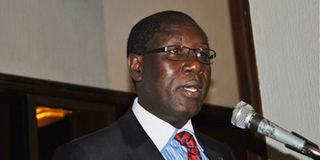CCK now rules out third digital signal distributor

Communications Commission of Kenya (CCK) director general Francis Wangusi. Photo/FILE
The communications regulator has broken a promise to award a third digital signal distribution licence to local broadcasters.
Addressing a press conference on Monday, Communications Commission of Kenya (CCK) director general Francis Wangusi said it is currently “not tenable” for the government to issue a third digital signal distribution licence.
“We do not have sufficient spectrum to be able to give a third signal distribution licence, even if we wanted to do that,” said Mr Wangusi.
This is the latest twist in a saga that emerged in 2011 after the government bypassed local broadcasters and awarded the two digital signal distribution licences to a Chinese firm and the national broadcaster.
In a rejoinder, Media Owners’ Association (MOA) chairman Kiprono Kittony told Nation that CCK’s statement was a poor excuse saying industry players should not be left out of the process given the crucial role they play in the sector.
“This is a poor excuse. Industry players cannot be completely left out of something so crucial to our operations and our freedom,” Mr Kittony said.
Following intensive lobbying, the government last year acquiesced and promised to issue a third digital signal distribution license.
Lack of spectrum
However, on Monday, Mr Wangusi said due to international regulatory changes, the country does not have adequate broadcast spectrum to justify the presence of a third digital signal distributor in the country.
During a conference last year, the International Telecommunication Union (ITU) resolved to reallocate a part of the frequency previously used by the broadcast industry to mobile telephone services.
This, CCK says, constraints the country’s ability to accommodate a third digital signal distributor.
In 2011, the CCK raised uproar following a decision to award Kenya’s second digital signal distribution licence to a Chinese company, Pan African Network Group.
The other licence had been awarded to Signet, a subsidiary of the state broadcaster.
Media owners opposed the move on grounds that the situation was a threat to press freedom and to the business model of the broadcast industry.
The director general urged media owners to engage in Public Private Partnerships with the government on the Signet licence or to buy into Pan African Group if they hope to play a part in digital signal distribution.
Digital migration
“As one of the conditions to the foreign distributor, we gave them two years to get a local shareholder. They can still partner with them (Pan African Network Group), buy shares and if they want,” said Mr Wangusi.
Kenya is planning to migrate from the analogue broadcasting system to the digital broadcasting system before the end of this year.
Once this happens, Mr Wangusi reckons that enough spectrum might be freed up to allow for a third distributor.
However, the competitive edge of new entrants will be significantly dulled.
Mr Kittony had previously indicated that the industry will engage the new information and communication cabinet secretary, Dr Fred Matiangi, to resolve the matter.




